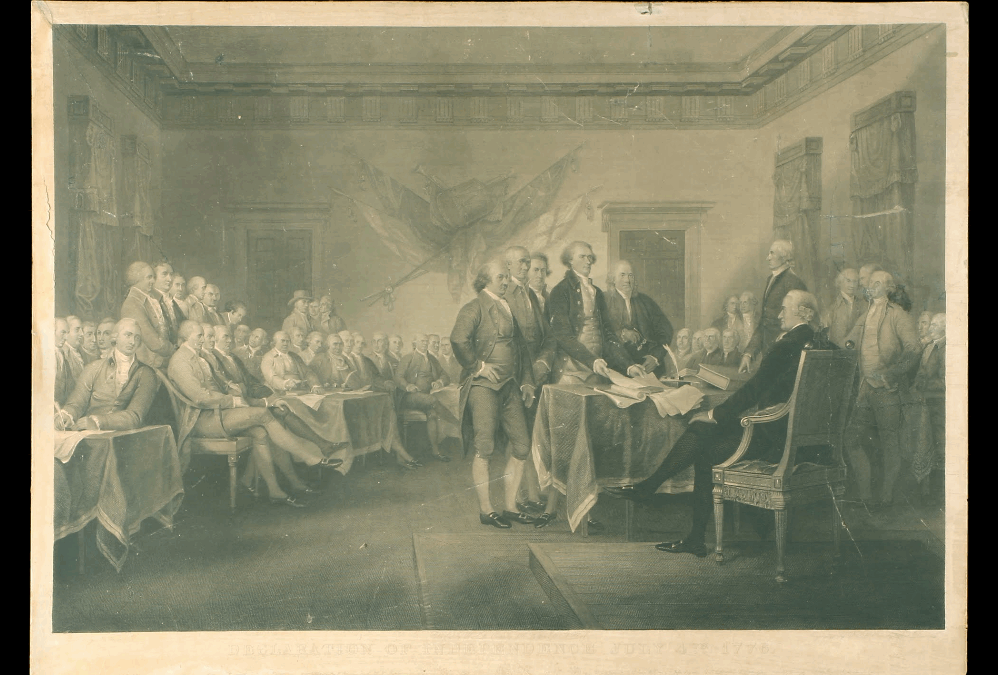My grandmother was born in 1895 (or maybe 1896). Her grandfather was a Union solider in the Civil War and his grandfather was a Revolutionary War soldier. Hanging on the wall of her small house in the mountains of North Carolina was a copy of the famous engraving, “The Declaration of Independence, July 4, 1776”, torn out of a magazine and framed in a handmade frame. Every July 4th, I put that old picture out on the table with a book bound copy of the Declaration published in the 1860’s.
As I was setting it out this year, I wondered what happened to the men depicted in the (somewhat apocryphal) engraving. I had often heard about the sacrifices made by these men who pledged, “their lives, their fortunes and their sacred honor,” to sign this dangerous document, but I didn’t realize that it was the subject of much controversy and fact checking. I am going to do my best to quote the most accurate sources, but I don’t want to get embroiled in a controversy about whether some indeed went bankrupt or whether some of their sons were killed in the Revolutionary war or only taken prisoner. While some writers have indicated that the men suffered expressly because they signed the Declaration, it’s perhaps more accurate to say that they suffered because they went to war with the homeland. The point is, that they knew what they were doing would come at a cost.
Twenty-four were lawyers and jurists, 11 were merchants, 9 were farmers or large plantation owners. They were all well-educated men of means with a lot to lose materially, and with families- most with children either old enough to fight or young enough to suffer depravation. They put everything on the line, including their lives since they would have been hung as traitors if we lost the war – and to be clear – winning a war against one of the most powerful empires in the world was highly unlikely.
- 5 signers were captured — George Walton, Thomas Heyward Jr., Arthur Middleton, Edward Rutledge and Richard Stockton, although none died in prison.
- Two sons of one signatory, Abraham Clark, were captured and imprisoned by the British, and John Witherspoon’s eldest son was killed in the war.
- Braxton died penniless – perhaps in part because his ships were captured carrying supplies
- Thomas McKeam was forced to move his family almost constantly, and served in Congress without pay.
- Francis Lewis’ home was destroyed, and his wife was captured by the British.
- John Hart was driven from his wife’s bedside as she was dying. Their 13 children fled for their lives. His fields and his gristmill were laid to waste and for more than a year he lived in forests and caves, returning home to find his wife dead and his children vanished.
All of them paid some kind of price for the Revolution, some more dramatic than others. They knew that it was going to come at a cost, and it did. Their courage stands in stark contrast to the depressing news stories about individuals who defraud the government or seek to undermine the Constitution. As I watch the fireworks on this 4th of July, I will be thinking about Thomas Paine’s famous quote, “That which we obtain too easily, we esteem too lightly.”

Dr. Fife is a world renowned wound care physician dedicated to improving patient outcomes through quality driven care. Please visit my blog at CarolineFifeMD.com and my Youtube channel at https://www.youtube.com/c/carolinefifemd/videos
The opinions, comments, and content expressed or implied in my statements are solely my own and do not necessarily reflect the position or views of Intellicure or any of the boards on which I serve.




Very powerful. Thanks for sharing.
We find ourselves again in times that try men’s souls. Thank our for remembering the bravery of our ancestors.
John K
Dr Fife,
Of all you have written and inspired this year, your reflections today are among the most important of all. Thank you for being bold to declare the truth and witness to the importance of knowing our country’s history that allows us to yet celebrate freely today.
Mark Melin